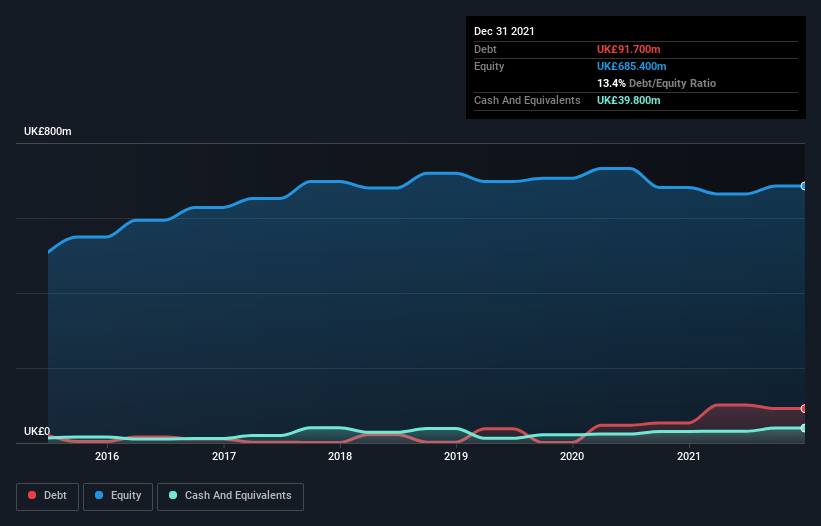
Legendary fund manager Li Lu (who Charlie Munger backed) once said, 'The biggest investment risk is not the volatility of prices, but whether you will suffer a permanent loss of capital.' So it seems the smart money knows that debt - which is usually involved in bankruptcies - is a very important factor, when you assess how risky a company is. We note that Bodycote plc (LON:BOY) does have debt on its balance sheet. But should shareholders be worried about its use of debt?
Why Does Debt Bring Risk?
Generally speaking, debt only becomes a real problem when a company can't easily pay it off, either by raising capital or with its own cash flow. Ultimately, if the company can't fulfill its legal obligations to repay debt, shareholders could walk away with nothing. However, a more usual (but still expensive) situation is where a company must dilute shareholders at a cheap share price simply to get debt under control. Of course, debt can be an important tool in businesses, particularly capital heavy businesses. The first step when considering a company's debt levels is to consider its cash and debt together.
See our latest analysis for Bodycote
What Is Bodycote's Net Debt?
You can click the graphic below for the historical numbers, but it shows that as of December 2021 Bodycote had UK£91.7m of debt, an increase on UK£53.2m, over one year. However, it does have UK£39.8m in cash offsetting this, leading to net debt of about UK£51.9m.

How Healthy Is Bodycote's Balance Sheet?
Zooming in on the latest balance sheet data, we can see that Bodycote had liabilities of UK£263.0m due within 12 months and liabilities of UK£121.4m due beyond that. Offsetting this, it had UK£39.8m in cash and UK£129.5m in receivables that were due within 12 months. So it has liabilities totalling UK£215.1m more than its cash and near-term receivables, combined.
Of course, Bodycote has a market capitalization of UK£1.15b, so these liabilities are probably manageable. But there are sufficient liabilities that we would certainly recommend shareholders continue to monitor the balance sheet, going forward.
We measure a company's debt load relative to its earnings power by looking at its net debt divided by its earnings before interest, tax, depreciation, and amortization (EBITDA) and by calculating how easily its earnings before interest and tax (EBIT) cover its interest expense (interest cover). This way, we consider both the absolute quantum of the debt, as well as the interest rates paid on it.
Bodycote's net debt is only 0.34 times its EBITDA. And its EBIT covers its interest expense a whopping 28.1 times over. So we're pretty relaxed about its super-conservative use of debt. Another good sign is that Bodycote has been able to increase its EBIT by 28% in twelve months, making it easier to pay down debt. When analysing debt levels, the balance sheet is the obvious place to start. But ultimately the future profitability of the business will decide if Bodycote can strengthen its balance sheet over time. So if you're focused on the future you can check out this free report showing analyst profit forecasts.
Finally, a company can only pay off debt with cold hard cash, not accounting profits. So the logical step is to look at the proportion of that EBIT that is matched by actual free cash flow. During the last three years, Bodycote generated free cash flow amounting to a very robust 98% of its EBIT, more than we'd expect. That puts it in a very strong position to pay down debt.
Our View
The good news is that Bodycote's demonstrated ability to cover its interest expense with its EBIT delights us like a fluffy puppy does a toddler. And the good news does not stop there, as its conversion of EBIT to free cash flow also supports that impression! Overall, we don't think Bodycote is taking any bad risks, as its debt load seems modest. So the balance sheet looks pretty healthy, to us. When analysing debt levels, the balance sheet is the obvious place to start. But ultimately, every company can contain risks that exist outside of the balance sheet. Be aware that Bodycote is showing 2 warning signs in our investment analysis , you should know about...
Of course, if you're the type of investor who prefers buying stocks without the burden of debt, then don't hesitate to discover our exclusive list of net cash growth stocks, today.
Valuation is complex, but we're here to simplify it.
Discover if Bodycote might be undervalued or overvalued with our detailed analysis, featuring fair value estimates, potential risks, dividends, insider trades, and its financial condition.
Access Free AnalysisHave feedback on this article? Concerned about the content? Get in touch with us directly. Alternatively, email editorial-team (at) simplywallst.com.
This article by Simply Wall St is general in nature. We provide commentary based on historical data and analyst forecasts only using an unbiased methodology and our articles are not intended to be financial advice. It does not constitute a recommendation to buy or sell any stock, and does not take account of your objectives, or your financial situation. We aim to bring you long-term focused analysis driven by fundamental data. Note that our analysis may not factor in the latest price-sensitive company announcements or qualitative material. Simply Wall St has no position in any stocks mentioned.
About LSE:BOY
Bodycote
Provides heat treatment and thermal processing services worldwide.
Adequate balance sheet average dividend payer.
Similar Companies
Market Insights
Community Narratives




